Sing:
Hark the Vesper bell is pealing,
O’er the meadow soft and green.
Nearer now and nearer stealing,
Soft it breaks upon my ear.
Jubilate, jubilate, jubilate, amen. Jubilate, jubilate, jubilate, amen.
First Words: Last week Civil Rights’ advocate and congressman John Lewis was laid to rest in Atlanta, Georgia. His funeral was a tribute not only to the man, but to his ideas and ideals. His remarks about trouble and people who cause trouble were inspiring. Here is what he said:
“My parents told me in the very beginning as a young child when I raised the question about segregation and racial discrimination, they told me not to get in the way, not to get in trouble, not to make any noise…..Get in good trouble, necessary trouble, and help redeem the soul of America.”
“Good trouble.” Hmmm…that phrase was a mind tickler! This Vespers will help us all think more deeply about trouble, both good and bad!
Sing: “I Stuck My Head in a Little Skunk’s Hole”—camp song Note: We will start with a very silly camp song, but it can help us get to this matter of “trouble”. Here’s the song for you to sing out in full silliness!
Well, I stuck my head in a little skunk’s hole
And the little skunk said,
“Well bless my soul!
Take it out, take it out, take it out,
REMOVE IT”
Well, I didn’t take it out,
And the little skunk said,
“If you don’t take it out,
You’d wish you were dead,
Take it out, take it out, take it out,”
SSSSSSSS….
I removed it!
Poem: “Noise Day”by Shel Silverstein
Let’s have one day for girls and boyses
When you can make the grandest noises.
Screech, scream, holler and yell….
Buzz a buzzer, clang a bell,
Sneeze—hiccup—whistle—shout,
Laugh until your lungs wear out,
Toot a whistle, kick a can,
Bang a spoon against a pan,
Sing, yodel, bellow, hum,
Blow a horn, beat a drum,
Rattle a window, slam a door,
Scrape a rake across the floor,
Use a drill, drive a nail,
Turn the hose on the garbage pail,
Shout Yahoo-Hurrah-Hurray,
Turn up the music all the way,
Try and bounce your bowling ball,
Ride a skateboard up the wall,
Comp your food with a smack and a slurp,
Chew-Chomp-hiccup-burp.
One day a year do all of these,
The rest of the days—be quiet please.
Sing: “She Sailed Away”, another camp song!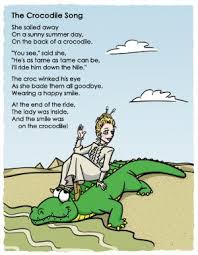
She sailed away,
On a lovely summer’s day,
On the back of a crocodile.
“You see”, said she, “he’s as tame as tame can be-
I’ll sail him down the Nile.
The croc winked his eye as she waved them all goodbye
Wearing a happy smile.
At the end of the ride, the lady was inside
And the smile was on the crocodile!
Two Favorite Stories: These two stories have been favorites at camp over many summers. Each one is about a kind of trouble and both have lessons for us on this matter of “good” trouble.
The first one is A. A. Milne’s “In Which Kanga and Baby Roo Come to the Forest, and Piglet Has a Bath”. It’s particularly fitting for this particular Vespers, not only because it touches on the question of good and bad trouble, but also because it is about the arrival in the Hundred Acre Wood, of two new comers. Today, had camp been in session, new comers woud be arriving for third session. How could there be trouble about arriving?
Let’s see what sort of mischief Pooh and the other residents of the Wood got into and what lessons they then learned!
A.A. Milne sets the stage:
“ Nobody seemed to know where they came from, but there they were in the Forest: Kang and Baby Roo. When Pooh asked Christopher Robin, ‘How did they come here?’ Christopher Robin said, ‘In the Usual Way, if you know what I mean, Pooh,’ and Pooh, who didn’t, said ‘Oh!’ Then he nodded his head twice and said, ‘In the Usual Way. Ah.’ Then he went to call upon his friend Piglet to see what he thought about it. And at Piglet’s house he found Rabbit. So they all talked about it together. “
The story continues with the conversation among the original animals eventually determining that having Kanga and Baby Roo in the Wood was NOT desirable. And so…trouble was brewing!
Rabbit summarized one problem:
‘Here—we—are,’ said Rabbit very slowly and carefully, ‘all—of—us, and then, suddenly, we wake up one morning and, what do we find? We find a Strange Animal among us. An animal of whom we have never even heard before! An animal who carries her family about with her in her pocket! Suppose I carried MY family about with me in MY pocket, how many pockets should I want?’
Unfortunately, not being accepting of difference caused a very bad decision to be made by these woodland residents. They spent some time developing a plot by which they could steal Baby Roo, thereby driving Kanga and Baby Roo out of the Forest entirely. Here is Rabbit’s list of the plot: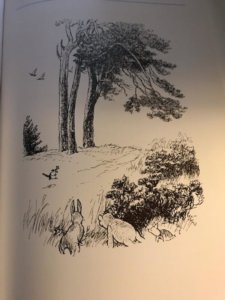
- ‘General Remarks. Kanga runs faster than any. Of Us, even Me.
- More General Remarks. Kanga never takes her eye off Baby Roo, except when he ‘s safely buttoned up in her pocket.
- Therefore…If we are to capture Baby Roo, we must get a Long Start, because Kanga runs faster than any of Us, even Me. (See 1.)
- A Thought. If Roo had jumped out of Kanga’s pocket and Piglet had jumped in, Kanga wouldn’t know the difference, because Piglet is a Very Small Animal.
- Like Roo.
- But Kanga would have to be looing the other way first, so as not to see Piglet jumping in.
- See 2.
- Another Thought. But if Pooh was talking to her very excitedly, she MIGHT look the other way for a moment.
- And then I could run away with Roo.
- Quickly.
- And Kanga wouldn’t discover the difference until Afterwards.’
After Rabbit delivered the summary of the plan, further details were sorted out (including a discussion of how fierce Kangas are, whether Pooh reciting a poem might be the best way to distract Kanga, and for Piglet, whether the risks were just too great!). In the end, however, the friends agreed to hatch the plot and off they went to find Kanga and Baby Roo. They were found in a pleasant part of the Wood and the plot unfolded! Successfully. Piglet was eventually settled in for a rough ride in Kanga’s pocket. Baby Roo was hustled off to play with Rabbit’s friends and family, and Pooh continued with his pleasant plans to do very little that afternoon.
Well…here’s how A.A. Milne describes what happened when Kanga arrived home:
‘Of course, as soon as Kanga unbuttoned her pocket, she saw what had happened. Just for a moment, she thought she was frightened, and then she knew she wasn’t; for she felt quite sure that Christopher Robin would never let any harm happen to Roo.
So she said to herself, “If they are having a joke with me, I will have a joke with them.”
And then….Piglet’s situation became quite unexpectedly difficult! He had expected the others to show up and to startle Kanga into realizing she really shouldn’t be in the Wood. But the others did not show up! And Kanga, seeing clearly that the Roo she had brought home in her pocket was actually Piglet, came up with a quick plan to turn the prank around! She knew that Piglets did NOT appreciate baths. And so…she determined that this Piglet would get the bath of his lifetime! Here’s how it all went down: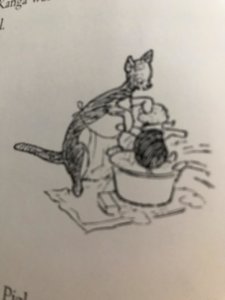
‘I am not at all sure,’ said Kanga in a thoughtful voice, ‘that it wouldn’t be a good idea to have a COLD bath this evening. Would you like that, Roo, dear?’
Piglet, who had never been really fond of baths, shuddered a long, indignant shudder, and said in as brave a voice as he could:
‘Kanga, I see the time has come to spleak painly.’
‘Funny little Roo,’ said Kanga, as she got the bathwater ready.
‘I am NOT Roo’, said Piglet loudly. ‘I am Piglet!
‘Yes, dear, yes’, said Kanga soothingly. ‘And imitating Piglet’s voice, too! So clever of him,’ she went on, as she took a large bar of yellow soap out of the cupboard. ‘What Will he be doing next?’
‘Can’t you see?’ shouted Piglet. ‘Haven’t you got EYES? Look at me!’
‘I AM looking, Roo, dear,’ said Kanga rather severely. ‘And you know what I told you yesterday about making faces. If you go on making faces like Piglet’s, you will grow up to LOOK like Piglet—and THEN think how sorry you will be. Now then, into the bath, and don’t let me have to speak to you about it again.’
Well…you can imagine how that bath went for poor Piglet, who really did NOT appreciate baths. Fortunately Christopher Robin showed up right as Kanga was pulling Piglet out of the bath. Christopher Robin quickly cleared up the question about whether Piglet was Roo…or not. But Christopher Robin, eager to teach Piglet, Pooh, and Rabbit about inappropriate trouble in the Wood, was not quick to let Piglet off the hook for his part of the mischief!
A.A. Milne continues:
“Oh, you’re not Piglet,” he said. “I know Piglet well, and he’s QUITE a different colour.”
Piglet began to say that this was because he had just had a bath, and then he thought that perhaps he wouldn’t say that, and as he opened his mouth to say something else, Kanga lipped a medicine spoon in, and then patted him on the back and told him that it was really quite a nice taste when you got used to it.
‘I knew it wasn’t Piglet’, said Kanga. “I wonder who it can be.’
“Perhaps it’s some relation of Pooh’s’, said Christopher Robin. ‘What about a nephew or an uncle or something?”
Kanga agreed that this was probably what it was, and said that they would have to call it by some name.
‘I shall call it Pootel,’ said Christopher Robin. ‘Henry Pootel for short’.
And just when it was decided, Henry Pootel wriggled out of Kanga’s arms and jumped to the ground. To his great joy, Christopher Robin had left the door open. Never had Henry Pootel Piglet run so fast as he ran then, and he didn’t stop running until he had got quite close to his house. But when he was a hundred yards away he stopped running, and rolled the rest of the way home, so as to get his own nice comfortable colour again….
So Kanga and Roo stayed in the Forest. And every Tuesday Roo spent the day with his great friend Rabbit, and every Tuesday Kanga spent the day with her great friend Pooh, teaching him to jump, and every Tuesday Piglet spent the day with his great friend Christopher Robin. So they were all happy again.”
Well…so there’s a bit of trouble that ended up being resolved happily, but was certainly not “good trouble”. It began with the residents of the Hundred Acre Wood being unwelcoming, being unaccepting of a new animal with a different look than the animals they already knew, and with a willingness to scare away that new animal with a scary plot. Of course, as the animals got to know each other thereafter, those stereotypes, biases and bad behaviors were set aside and a happy peace settled over the Forest once again. As usual, Pooh and his pals offer lessons to readers on many levels. Thanks, A. A. Milne!
Sing: “House At Pooh Corner”, a camp song. We sang this one together just a week or two ago, so you’re well practiced. Sing out!
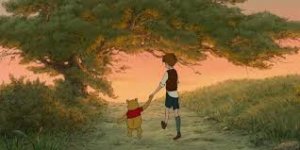 Christopher Robin and I walked along
Christopher Robin and I walked along
Under branches lit up by the moon.
Posing our questions to Owl and Eeyore
As our days passed away all too soon.
But I’ve wandered much farther today than I should,
And I can’t seem to find my way back to the Wood,
CHORUS:
So help me if you can
I’ve got to get back to the house at Pooh Corner by one.
You’d be surprised there’s so much to be done.
Count all the bees in the hive, chase all the clouds from the sky
Back to the days of Christopher Robin and Pooh.
Winnie the Pooh doesn’t know what to do.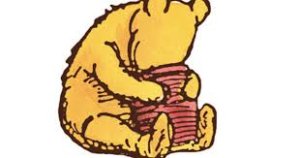
He’s got a honey jar stuck on his nose.
He came to me asking help and advice,
And from there no one knows where he goes.
So I sent him to ask of the owl, if he’s there.
How to loosen the jar from the nose of a bear.
CHORUS
A Second Story: “Winston of Churchill: One Bear’s Battle Against Global Warming”,
by Jean Davies Okimoto, illustrated by Jeremiah Trammell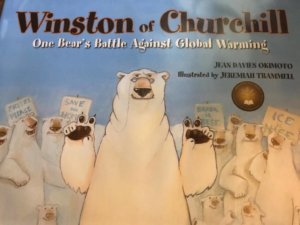 Here’s a story about “good trouble”! You will see the difference right off!
Here’s a story about “good trouble”! You will see the difference right off!
“Winston of Churchill was a great white bear. Every year in the late fall and early winter, Winston and the other polar bears came to hunt from the ice of Hudson Bay near the town of Churchill, in the Canadian province of Manitoba.
Winston was a fierce, brave bear, and when Winston spoke, every bear listened.
Young and old bears, father ears, mother bears, teenager bears, all the bears listened. Even cubs. Every furry face was turned to Winston and a hush fell over the crowd.
‘My fellow creatures, I have called this meting today to discuss a serious problem. The ice is melting. We are losing our home. The time has come for action. This is no time for ease and comfort. It is the time to dare and endure.
Do we want to spend the rest of our lives at the dump?’
‘No! No!’ shouted the bears. ‘We want ice! Ice is nice!’
‘We will fight for ice,’ boomed Winston. ‘We shall defend our island, whatever the cost may be. We shall fight on the beaches. We shall fight on the landing grounds. We shall fight in the fields and in the streets. We shall fight on the hills. We shall never surrender.’
All the bears cheered and cheered.
In the back row a cub raised his paw.
‘Yes, son,’ Winston called on him.
‘We don’t live on an island. We live in Manitoba.’
‘I know that, it was just a figure of speech.’
Winston noticed the cub raised his paw again.
“Now what?’
‘I have another question.’
‘What is it?’ Winston puffed on his cigar.
‘Who are we fighting?’
‘I was about to get to that, son.’ Winston puffed again on his cigar. ‘Ice is melting because it’s getting too warm around here and people are doing it with their cars and smoke stacks. And cutting down trees.’
‘How does that happen?’
“I wrote this book about it. There’s one for everybody. Come up here and help me pass them out.’
‘But what can we do?’
‘We can’t do anything, ‘Winston said. ‘We are bears. We don’t drie cars or burn coal. We like it cold.’
‘Yes, ice is nice,’ everyone agreed.
‘It’s the people who have to change,’ shouted Winston. ‘Not bears! And we must convince them to do it!’
‘Now listen carefully, here’s my plan: tomorrow when the tourists board the tundra buggies and those buggies begin to roll, they’ll roll right into our polar bear protest! Are you with e? Are you ready to march?’
‘Yes!’ shouted the bears.
‘Are you ready to fight for ice?’
“Yes!’ shouted the bears.
The next morning it was cold and clear, and in the town of Churchill the tourists began to wake up. They ate breakfast in the restaurants of the town. Then it was time to go. Time to see the bears. The tourists were very excited as they boarded the tundra buggies.
There were people from Billings, Montana; Tacoma, Washington; Portland, Oregon; and Brunswick, Maine. There were people from Evanston, Illinois; Hudson, Ohio, Boise, Idaho; and Halifax, Nova Scotia. There was even a family from Tokyo, Japan; three couples from Auckland, New Zealand; a man from San Diego, California; and two Welsh ladies who lived in a place called Brynhyfryd Llanddarog that no one could pronounce.
They drove and drove but there was not a bear in sight. The tourists kept staring out the windows at the tundra, looking for the bears, but the only thing they saw was tundra. The tourists were very disappointed. They began to grumble and complain. One man from Boise wanted his money back. So did a lady from Billings.
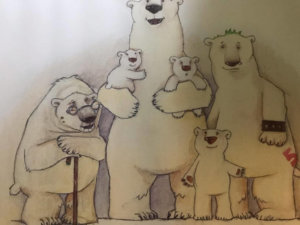 Their complaints got louder and louder, when suddenly, far out on the tundra there was an amazing sight. Every bear in Churchill was marching across the tundra. They were following a fierce, brave bear.
Their complaints got louder and louder, when suddenly, far out on the tundra there was an amazing sight. Every bear in Churchill was marching across the tundra. They were following a fierce, brave bear.
The tourists were so excited to see the bears. They took picture after picture, and when they got home they showed their pictures to their friends and families. In every picture was a fierce, brave bear holding a sign that said, “We must all do our part, no matter how small.’
Sing: “Forever Strong”, with apologies to Bob Dylan
May God bless and keep you always
May your wishes all come true
May you always do for others,
And let others do for you.
May you climb the ladder to the stars,
And stand on every rung.
May you be….Forever strong.
CHORUS: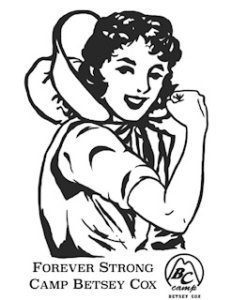
Forever strong, Forever strong.
May you be, Forever strong.
May you grow up to be righteous,
May you grow up to be true.
May you always know the truth
And see the light surrounding you.
May you always be courageous,
Stand upright and be strong.
May you be…forever strong.
![]() CHORUS
CHORUS
May your hands always be busy,
May your feet always be swift.
May you have a strong foundation
When the winds of changes shift.
May your heart always be joyful.
May your song always be sung.
May you be, forever strong.
![]() CHORUS
CHORUS
Next Words: John Lewis led a life in which he watched for opportunities to become involved in “good trouble”. Our two stories reveal what he meant. “Good trouble” is trouble that moves us all towards being our better selves. Trouble may find us as we take action for what is good and right, but we can rest assured that the silver lining to such troubles is that the world can be improved by each and every right choice. John Lewis was involved in some dangerous “good trouble”. He was more courageous than most of us will ever be in putting even his life on the line for the right. Each of us, though, can find a bit of courage in these times. The days ahead will ask each one of us to do just that. Where would you choose to practice growing your courage? You could do it in a cabin discussion where you have a chance to speak your mind. You could do it quietly by volunteering in places that need help. You could join in at protests for causes you care about. There are places. And there will always BE places. Remember that courage is easier to find when others share ideas and convictions with you. At camp you’ll find chances to discover just who the others in our community are that share your hopes and dreams and your commitment to make them happen! It is so exciting when the pieces come together and progress emerges! May each of us have that experience many times over in the coming year. And may we each, no matter what age we are, find the chance to practice courage as the important days ahead bring ample opportunities! And of course, be very sure that you avoid “bad trouble”!
Final Words: “When I am among the Trees”, by Mary Oliver Note: How could a Vespers be complete without Mary Oliver. Here are her words in a poem that suggests one way to find the strength to have courage!

When I am among the trees,
especially the willows and the honey locust,
equally the beech, the oaks and the pines.
They give off such hints of gladness.
I would almost say that they save me, and
daily.
I am so distant from the hope of myself,
In which I have goodness, and discernment,
and never hurry through the world
but walk slowly, and bow often.
Around me the trees stir in their leaves
and call out, ‘Stay awhile.’
The light flows from their branches
and they call again, ‘It’s simple, ‘ they say,
‘and you too have come
into the world to do this, to go easy, to be
filled
with light, and to shine.’”
Silence
Jubilate, jubilate, jubilate, amen. Jubilate, jubilate, jubilate, amen.



